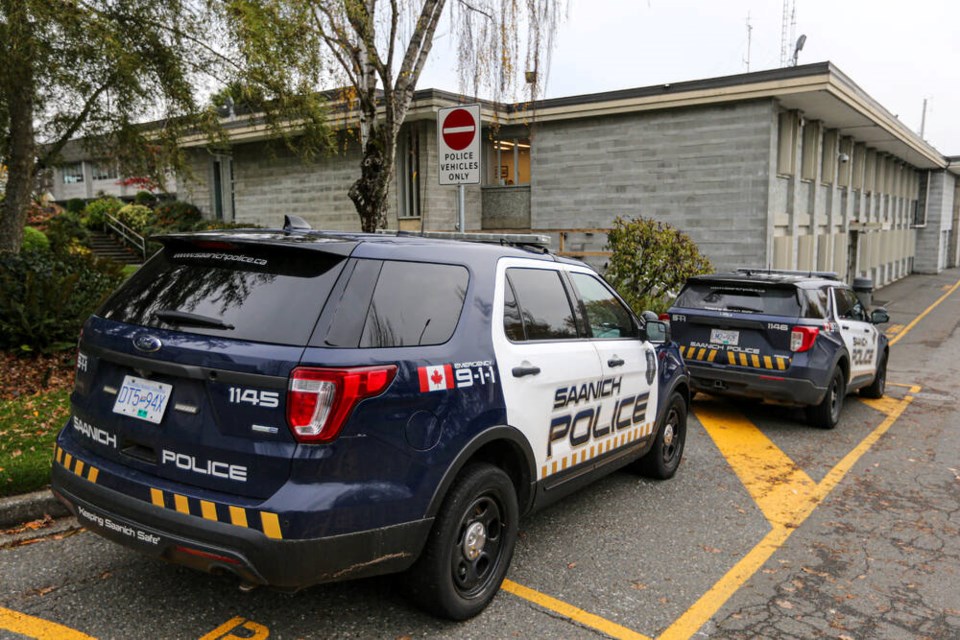Police departments in Greater Victoria are keeping a close eye on staffing levels as the Omicron variant of COVID-19 sweeps through the region and among their ranks.
Last Thursday, Victoria Police Department took the unprecedented step of invoking a clause in the collective agreement with the Victoria City Police Union that would allow the chief to redeploy officers to front-line positions to bolster call response.
Saanich Police Department, which has 185 officers, says it isn’t planning to follow suit — for now.
“We are constantly monitoring the situation but, at this time, we have no plans to assign non-uniformed members to the front line,” said Const. Markus Anastasiades, spokesman for the Saanich department.
He said to minimize staff exposure to COVID-19, the force has taken steps to reduce close interactions with the public, including suspending fingerprinting services as part of criminal record checks until Jan. 18 at the earliest. The process can be required for volunteers in contact with vulnerable people.
“Fingerprinting involves close physical interaction, such as an officer pressing down on an individual’s finger to obtain a fingerprint,” said Anastasiades. “To keep our staff safe, we want to keep all close interactions to a minimum.”
The suspension does not affect fingerprinting for criminal identification.
The force’s reserve constable program has also been put on hiatus, because COVID-19 protocols dictate that officers ride in patrol cars solo. As reserve constables need to be supervised at all times, having a second person in the vehicle would deviate from the protocol.
Should staffing levels fall, the priority would be to pull officers from other sections to maintain front-line officers to respond to 911 calls, Anastasiades said.
In Oak Bay, Deputy Chief Constable Mark Fisher said the police department, which totals 21 members, has little leeway should staff be hit by an outbreak of the highly transmissible Omicron variant.
“We have some contingencies in place should the need arise, but we are a small department and the only position we can pull from would be the school liaison,” he said.
In Central Saanich, the police department is staggering shifts and support staff are working from home whenever possible. The department consists of 27 officers and three support staff, with no absences reported so far due to illness.
While there is no formal protocol in the collective agreement for movement of staff, the union representing the officers said it would work with management should the need arise to have members work in alternate roles.
“We have been very, very fortunate so far,” said Chief Ian Lawson. “Should the need arise, we have informal cross-jurisdictional mutual-aid agreements with neighbouring police departments.”
As for the RCMP, which has 25 detachments serving Vancouver Island, a spokesman said the force does not provide specific numbers of members and support staff sidelined by the pandemic.
But spokesman Sgt. Chris Manseau said the RCMP does anticipate that there could be a rise in employees requiring sick leave or time off due to illness or exposures, and has contingency plans for detachments, based on essential service requirements.
Unlike local police departments, the RCMP can pull resources from around the province to address urgent needs. Manseau said detachments are continually assessing their services and programs, and where necessary, reducing front counter services, cancelling events and enhancing precautions.
”Should redeployment of RCMP resources be required, it will not affect the routine policing duties in their home communities. We constantly assess our resource deployment based on emergent needs, while ensuring policing duties in all of the communities we provide service and other responsibilities we have as the provincial police force are not compromised.”
He said the majority of the RCMP’s COVID-19 exposures to date have been related to community or personal contacts and not related to policing duties or interactions with the public.

